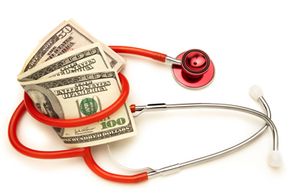It makes a lot of sense that some emergency room visits are exorbitantly expensive. Let's say you have a trauma wound that requires emergency surgery, for instance, or a stroke that needs a clot-busting medicine that doesn't come cheap. Add to that a trip in the ambulance to get there, and you've got yourself a tidy little sum to pay to the hospital you visited.
Less sensible? The emergency room visit for the hand you stupidly sliced along with the carrots. It only required a few stitches, but you're looking at fees in the thousands of dollars [source: Rosenthal]. Even worse? You go to the ER with a horrible headache, only to discover it's just run-of-the-mill sinus pain and not something scarier. You're still getting a hefty bill, even if the sum of your treatment was a couple of ibuprofen. In fact, the average cost of an emergency room visit in 2013 was a migraine-producing $1,233 [source: Kliff]. Why exactly are costs so high for emergency care?
Advertisement
Unfortunately, your ER bill might just be a mystery to providers, hospitals and insurance as well. Each of these actors are determining your costs, and if you think for one second the costs are standard across providers or hospitals, you need to be evaluated by a medical professional for a diagnosis of unreasonable optimism. A 2013 study makes the point in the most depressing way: In a survey of 76.6 million emergency room department visits, the authors found an astounding disparity between charges [source: Caldwell et al.].
Included in the study is a handy chart, detailing the 10 most common emergency room diagnoses, with the mean, median, minimum and maximum charges applied. The most common diagnosis is a strain or sprain, and you'll find that the lowest charge for the diagnosis was $4. The highest? $24,100 [source: Caldwell et al.]. Huh? Better hope you get the cheap sprain next time you roll your ankle playing softball. A urinary tract infection was charged anywhere from $50 to $73,002 [source: Caldwell et al.].
So does this give us any idea why emergency room visits are so expensive? Well, it might tell us that a lack of transparency about how conditions are treated across the board may contribute to a willingness to charge higher prices. If patients knew, for instance, that they were paying hundreds of dollars more for the same procedures or treatments at other facilities, demand might dictate a lower price.
And a big reason why emergency room visits cost so much? They're charging for everything, from an aspirin to the defibrillator use. And remember that they have to keep the emergency department in a state of constant ready, whether someone is coming in for a stitch or a stroke. That means that if most people are coming in for stitches, the cost for those less-expensive procedures might be bumped up to help offset the price of expensive ones [source: Soltas].
So between variable costs, a vague system of prices and the general cost of running an emergency department, your trip to the ER may result in sticker shock. Wise to avoid mentioning the condition there, lest they add it to the bill.
Advertisement



